Meet Jill Koshiol, Epidemiologist and Stadtman Investigator
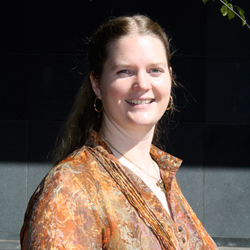
Jill Koshiol, Ph.D., is an epidemiologist and one of eight Stadtman Investigators who joined the NIH IRP in 2009-2010, the search's inaugural recruitment year. As a tenure-track principal investigator within the National Cancer Institute (NCI) Division of Cancer Epidemiology and Genetics (DCEG), Dr. Koshiol and her team study the epidemiology of infectious agents and cancer, and they are increasingly interested in the role of immune stimulation and inflammation in carcinogenesis.
In the Q&A below, Dr. Koshiol shares some thoughts on how she became a scientist and what's its like to conduct biomedical research at the NIH IRP.
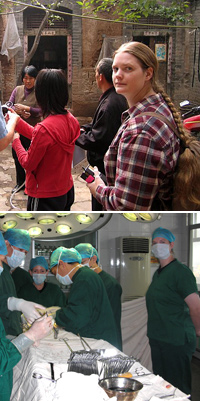
Jill is pictured in Linxian, China starting a pilot study to evaluate polycyclic aromatic hydrocarbons as a possible link to the high rate of esophageal cancer in the region (top). In Linxian, China, Jill is present for the set-up of a surgery to remove the top part of the stomach (gastrectomy) (bottom).
Q: Why did you choose this career?
A: I chose to become an epidemiologist because of a discussion with my dad. In high school, I enjoyed the sciences. I was fortunate to have great teachers. My biology teacher was a real character, and he encouraged my interest. By the time I was a sophomore in college, I knew I wanted to pursue a career in biology. There are so many directions you can take in biology, but I wasn’t sure which direction I wanted to take.
One day my dad, a pediatrician, asked me what I planned to do with my life. I knew that I didn’t want to be a physician. He suggested that I study epidemiology. Epidemiologists are the detectives of the the medical world, looking for causes of disease. That really appealed to me.
Epidemiologists use many clues to understand the causes of diseases. For example, they:
- Look at trends of the disease, such as cancer, in a given population, and understand how it compares to rates of disease in other population groups. Study what people might be doing or might be exposed to that may contribute to their risk. For example, I’m interested in understanding how infections can increase cancer risk.
- Look at a people’s inherited DNA to see if there are any genetic mutations that make us more susceptible to cancer
I enjoy investigating all these clues so that we can have a better understanding of the disease, and eventually, ways to prevent and treat it.
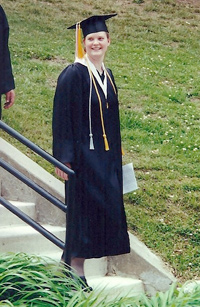
Jill Koshiol at her college graduation, Chapel Hill, North Carolina
Education
- Doctor of Philosophy, Epidemiology, University of North Carolina at Chapel Hill, Chapel Hill, NC
- Master of Science, Epidemiology, University of North Carolina at Chapel Hill, Chapel Hill, NC
- Bachelor of Science, Music, and Bachelor of Arts, Biology, William Jewell College, Liberty Missouri
Q: What does your typical workday involve?
A: My typical day is spent sitting in front of the computer to learn about current and past research by finding and reviewing published studies, writing proposals for new research projects, analyzing data, writing papers describing my results, and communicating and coordinating my research via email. I also attend meetings to discuss my projects and learn about science. No matter how much I know, there’s always more to learn. To conduct special research projects and share the results of those projects, I travel within the United States and abroad.
Tasks at my desk include:
- Analyzing information and statistical programming
- Meeting with my colleagues to discuss the progress of our studies and to plan future projects
- Writing up results of analysis and sharing them with other scientists in the field
- Reading professional journals to keep up with the latest information in the field. This also helps me when I am writing proposals for new projects.
- Thinking about the current questions in the field to direct future studies. I consider the most important and relevant questions that we need to answer, and the ones that I want to work on most.
My current research project
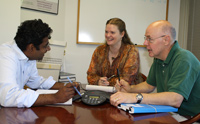
Jill meets with her colleagues to discuss current research projects.
I am currently doing a pilot study on gallbladder cancer in Chile. In Chile, gallbladder cancer is the number one cause of cancer deaths among women, and the third leading cause of death due to cancer in men. The overall goal of the study is to figure out the reasons for the high incidence (or rate of new cases) of gallbladder cancer in the region, and to identify ways to prevent it.
To do a statistically accurate study in Chile, we need to have thousands of participants. For the pilot study, we will enroll about 100 participants to see if our study procedures work. We will use specific questionnaires, sample collection procedures, and recruitment strategies. If these methods work for the pilot study, then we can expand the study using thousands of participants.
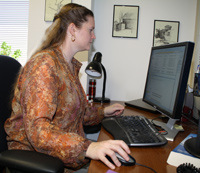
When she’s not traveling to do field work, Jill spends time at her desk writing research proposals and analyzing data.
Q: What do you like best/least about your work?
A: What I like best about my work is the feeling of contributing to the understanding of cancer through my research at the National Cancer Institute.
For example, human papillomavirus (or HPV) is a cause of cervical cancer. It is also proposed to cause other cancers. Some of my research looked at other sites like esophageal and lung cancer. We generally did not find HPV in these cancers in our study, but it was still important to the overall understanding of the disease. The results of this research were published in the Journal of the National Cancer Institute.
What I like least about my work is administrative details. There is a lot of paper work and processes to complete for any given project. A project has to be approved by many scientific review committees before we can begin, and the review process can take time.
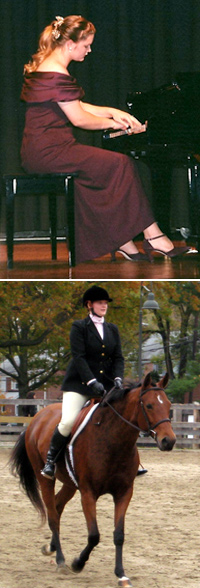
Jill plays a grand piano for a college concert (top). Jill wears English style riding gear at a horse show (bottom).
Q: What are your career goals?
A: I am excited about studying hepatobiliary cancer (cancers of the liver and the biliary tract, including gallbladder cancer). For me, hepatobiliary cancer has it all—infections like hepatitis viruses, inflammation, and a pressing need to understand who is most at risk of developing cancer. My main goal is to develop a research program in this area to try to understand the biological mechanisms that lead to cancer. My hope is that by understanding the biological causes of cancer, we can figure out ways to prevent it.
More technically speaking, since I’m on a tenure track, my next career goal is to get tenure. For tenure , you need 8 to 9 years of solid work before you can apply. During those years, you need to convince the overarching administrators that you are worthy of staying and doing more research. You need to have established an independent research program and something that is sustainable.
Q: When you are not working, what do you like to do?
A: When I’m not working, I like to go horseback riding and play music. I play piano, harp, and a little guitar. Sometimes I play in our church band.
Visit Dr. Koshiol's principal investigator page to learn more about her work.
Related Blog Posts
This page was last updated on Wednesday, July 5, 2023
